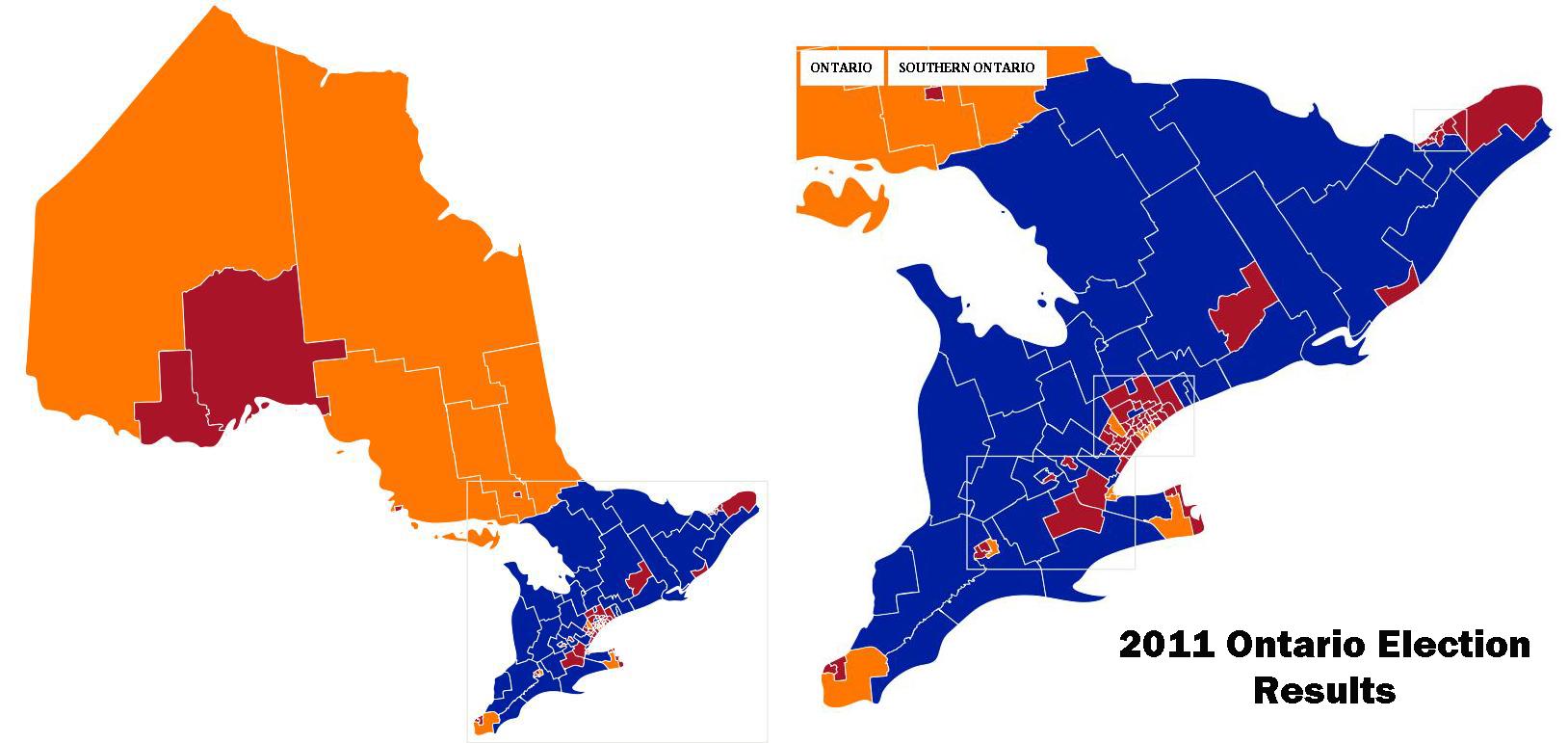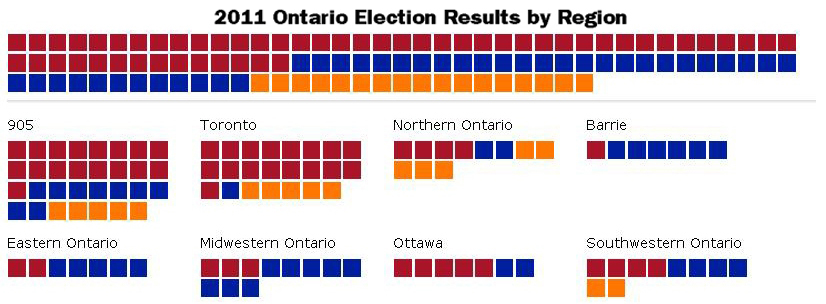|
October 7, 2011 - No. 10
40th Ontario General Election
Election Results
On October 6, the Liberal Party of Ontario led by Dalton
McGuinty won the 40th Ontario General election with 53 of Ontario's 107
seats, one seat short of a majority government and 19 less than in the
2007
election. The Conservatives won 37 seats, 11 more than in 2007 and the
NDP won 17 seats, seven more
than in the 2007 election.
According to an Elections
Ontario media release, the
turnout was the lowest in Ontario history with 49.02 per cent of
eligible voters casting a ballot, down from the 52.1 per cent of
eligible voters who cast a ballot in the 2007 election. Of the votes
cast, the Liberals received 37.6 per cent, the Conservatives 35.4 per
cent and the NDP 22 per cent.
Preliminary
figures also indicate that of the approximately
8,500,000 total eligible voters, 1,541,600 cast a ballot for the
Liberals. This
means that McGuinty's government has been re-elected with votes from
just 18 per cent of Ontario electors.
This is quite a devastating
result. Despite this, as if
there is nothing amiss when a government is elected by only 18 per
cent of the eligible vote, all the vested interests are carrying on
business as usual. Their verdict is that McGuinty received a "quasi
majority" and has a "mandate"
from the Ontario electorate to form the government. We are told that
the message from the electorate is they want a party which governs
"from the centre" and that "Ontario voters rejected the prospect of a
full right-leaning slate at all three levels of government."
Tim Harper of the Toronto Star
claims that "With Mayor Rob Ford's popularity in freefall since the day
Harper made his infamous hat trick call at the Ford family barbecue
last August, the prospects of
that trifecta suddenly didn't look good to Torontonians."
The Star writer goes on to claim that "the
renewed mandate for Liberals in Ontario does not save the federal
party, but had McGuinty lost Thursday, more dirt would have been
gleefully bulldozed on a federal Liberal grave by the media and
opponents. It gives the party brand credibility -- and maybe
a bit more bench strength in 2015 when Canadians next go to the polls
in a federal election."
Other explanations include
saying that McGuinty won a
vote of confidence for his "sound economic stewardship."
There is also an opinion that Hudak didn't win due to
his lack of experience and clumsiness in raising and/or handling
various controversial issues.
About the improved showing of the NDP, the fact that it
increased its seats from ten to 17 is presented as some sort of
failure, not a success. Some reports speak about the failure of voters
to come under the sway of a "halo effect" of a concocted Jackamania of
their own making. First, they concocted a scenario
for the Ontario election that it would be a repeat of the federal
election -- a Harper majority with an NDP opposition. Once the
unfolding events exposed the bankruptcy of their scenario, they then
shot it down. As Tim Harper wrote in the Star: "For federal
New Democrats, Thursday night's results
were a hint of reality. Although leader Andrea Horwath improved her
party's standing in the legislature, the results had to be a
disappointment. The 'Orange Crush' under the late Jack Layton ran into
strong headwinds in Ontario in May. Now it appears the halo effect in a
campaign which started right after his state
funeral never materialized."
As for the prospects facing Ontario under a McGuinty
government, various pundits and newspapers give the following opinions
and advice:
- According to the Star's Queen's Park
columnist Martin Regg Cohn, "We may also see a tougher McGuinty taking
aim at the federal government, pushing harder on his agenda to achieve
greater fairness for Ontario taxpayers who can no longer afford to prop
up an outdated equalization formula
as disproportionately as the province has in the past. His crusade to
gain greater fiscal fairness for Ontario has never gained much traction
before, but it is a theme he is likely to push even harder in pursuit
of a 10-year health funding deal with Ottawa -- especially given the
pressures on the provincial health budget.
[...]
"And we can expect to see a disciplined McGuinty. Even
his political opponents concede he has shown no sign of fatigue after
eight years in power and 15 years as Liberal leader. His advisers like
to boast that he still has the fire in his belly, and there is no
evidence that it is fading. [...]"
A McGuinty government will
play tough, says the Star's
Cohn.
"The
Liberals
came within a hair of winning a majority, and they
can be expected (like others before them in recent times) to govern as
if they had one. The narrow result will leave them in no mood to accept
opposition demands on
major policies or fiscal matters.
"Even if the New Democrats had more leverage with which
to wield the balance of power, the rules of the game have changed in
recent years. Minority governments aren't what they used to be.
"There will be fierce political battles ahead --
especially on the HST and corporate taxation. There will be a rough
ride on health care and government restraint as the government
struggles to rein in its deficit.
"After eight years as premier, Liberal Leader Dalton
McGuinty is not about to embark on a spending binge to secure NDP
support. He won't because he can't -- the treasury is tapped out
already. [...]
"McGuinty has already signalled he won't play by the old
rules (and the formal accord) that defined the 1985-87 Liberal
government, propped up by then-NDP leader Bob Rae."
"No accord, no coalition, no entente, no agreement --
formal or informal -- or any other linkage of any kind," the Star quoted McGuinty saying toward
the end of the campaign with respect to the prospect of a minority
government. The item continues:
"Outside events may force their hand more than any
preconceived battle plan. And the biggest unforeseen event could be an
economic storm that washes over Ontario's shores, playing to McGuinty's
strength as a tested steward during the last economic downturn.
"There will be other battles ahead, notably on changing
the way the government delivers services -- including health. A
commission headed by straight-talking economist Don Drummond is due to
deliver its report this fall, and it will paint a gloomy picture of the
challenges ahead. 'Whoever forms the government
on Oct. 7 is going to find themselves in a deep fiscal hole,' Drummond
told me during the summer lull while the politicians were making their
promises on the campaign trail. 'The public, certainly, doesn't
completely understand it, and I don't know whether the political
parties completely understand it.'"
In a post-election
editorial, the Globe and Mail
writes, "The Liberals must now urgently address the twin challenges of
an economic downturn and a large deficit."
Regarding the role that Horwath and the NDP might play,
the Globe tells us that government intervention in the
economy "is not in the Ontario mainstream, and if she hopes to exert
influence in the legislature, Ms. Horwath will need to begin some
ideological renewal within her party."
The Globe gives these final words of advice:
"The Liberals' mandate at Queen's Park is tenuous. Mr.
McGuinty will need to exercise some new political skills to renew his
cabinet and hold on to power. With bold steps to reduce public-sector
spending, continued reforms in health care and narrow, targeted
interventions in education, the Liberals can lead
Ontario through the troubled times to come."
As for Conservative Leader Tim Hudak, referring to the
Liberals' minority status, he said, "It is very clear the people of
Ontario have sent a strong message that they want a change in
direction." They "have put Dalton McGuinty on a much shorter leash," he
added.
Dalton McGuinty, in his "victory speech" at the Ottawa
Fairmont Hotel, declared, "We succeeded in our goal of electing an
experienced Liberal government. It's time to move forward, together."
In this way, an impression is created that now the
people have spoken and that is that, they have no further role to play
in how this province is governed for at least the next four years.
Unless of course, McGuinty fails to attract an NDPer or PC with a seat
in the cabinet in which case the scenario changes and
the prospects of wheeling and dealing or refusing to wheel and deal to
avert a non-confidence motion take over.
The important thing is for the workers and people of
Ontario to not entrust their fate to a government over whose agenda
they exercise no control. They can hold this government to account so
long as they keep pushing their own agenda for a new direction for
Ontario and keep arguing it out, letting
the Liberal agenda and that of all others reveal themselves.They can
do this by putting those agendas and whom they serve in context and
opposing the media's
disinformation about the government's agenda and its silence on the
workers' real working and living conditions, demands and concerns.
Ontario Political Forum
will continue to deal with these matters of great concern with the aim
of involving the workers and their allies in discussion on how to
provide the problems they face with solutions.

Maps of Election Results

 Blue corresponds to
ridings held by PCs, orange: NDP; red: Liberal. Click images to
enlarge. (Globe and Mail)
Blue corresponds to
ridings held by PCs, orange: NDP; red: Liberal. Click images to
enlarge. (Globe and Mail)

PREVIOUS
ISSUES | HOME
Read Ontario Political Forum
Website: www.cpcml.ca
Email: ontario@cpcml.ca
|